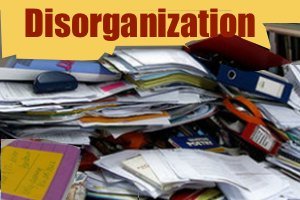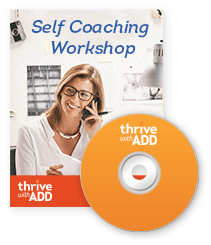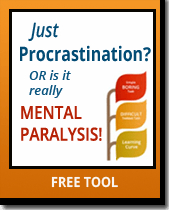Not for students only!
 As we count down to September, I’ve been having more coaching conversations with parents concerned about their ADD / ADHD kids returning to college.
As we count down to September, I’ve been having more coaching conversations with parents concerned about their ADD / ADHD kids returning to college.
It seems the summer before sophomore year is when parents are most likely to send out distress signals. The son or daughter may have gotten through their freshman year with difficulty, or perhaps had to drop courses. By the second year, it’s clear the student needs help and is more willing to accept it.
ADHD students’ struggles seem to fall into 4 buckets that I call the “4 D’s:”
1. DISORGANIZATION
2. DENIAL
3. DISTRACTION
4. DERAILMENT
Not unsurprisingly, if left unchecked, the same challenges that plague a student with ADD / ADHD will persist into adulthood. Just replace the words professor, friends and roommate for boss, colleagues and spouse.
So the next 4 posts will address the 4 D’s, which are NOT for students only!
DISORGANIZATION
College students who are away from home for the first time are faced with the need to be organized in a number of ways:
- Organize their space and stuff
- Organize papers and information
- Maintain a calendar for classes, exams and assignments
- Break down and schedule homework and projects to get them done
Each of these require different organization skills and habits that may not have been necessary before, when parents looked out for the student, and high school teachers were more accommodating.
When it comes to physical disorganization, there are the typically ADD kinds of reasons for clutter: impatience with putting things away, fear of “out of sight, out of mind,” or overwhelm at dealing with one’s own mess. It becomes a real problem when papers or assignments are lost, or notes taken in class can't be found when it's time to study for an exam. Students have to become systematic about where they keep things for each class, and develop a ritual of putting what they need in their bag or backpack the night before.
Entering things in a calendar, and looking at the calendar daily, has to become a habit. That requires a commitment to doing it regularly. Problems can arise when you don’t enter all your classes, appointments, assignment due dates and personal obligations in one place.
You need to be able to view the whole week at a glance in order to plan it out. Without seeing a whole week – or even a month or semester – it’s difficult to plan out how you’ll get all the assignments and studying done. You have to SEE the time that you actually have available.
There are additional skills required for accurate scheduling.
- First, the ability to break out and identify all the steps required to complete an assignments. For example, a typical college paper requires reading, research, note-taking, planning out the paper, writing it, editing it and proof-reading. That's 7 steps, yet most people only consider the Writing part.
- Second, an accurate sense of how long it actually will take you to do each of those steps. ADHD students can’t count on looking at their friends or roommate to gauge how long to spend on schoolwork. They may have to take extra time for certain steps, and require more breaks when their focus lags. And if you aren’t organized, figure extra time in for having to search for things!
Sound overwhelming? It can be, since no one actually teaches this to students before they leave home.
Why isn't this stuff taught in high school?
It’s tough for any teenager to learn all of this on their own, but non-ADHD people are more likely to pick it up with experience. ADD / ADHD kids are far less likely to learn from their own experience. Instead they struggle, feel ashamed and “stupid,” and never really learn how to make school less of a struggle.
You may have felt this way as a student, and perhaps you still find time management and organization to be an impossible mystery!
There are solutions.
COACHING – Becoming organized is a learnable skill, like any other. As an ADHD Coach, I work with individuals to develop their own best process for becoming organized with space, stuff, time and scheduling.
CLASSES to Download – Here are some classes for ADHD Adults that I’ve developed over the last 13 years that you can download. Click on each to get the description.
- Clear Clutter Fast – Learn a system for quickly sorting through papers
- Rituals to Change Habits – Create a ritual to help form necessary habits
- Get Unstuck with Mind-Mapping – Learn how to plan or break down anything intuitively
- Develop a Time Sense – Learn how to use your own (faulty) assumptions about time to your advantage
Next post, the second “D” – DENIAL!
Did lack of organization skills affect you as a student? What impact did that have on your performance?
Please SHARE and COMMENT below:





doug
oh, my! college waa a nightmare. i didn’t know how to study, and I didn’t know I didn’t know.
but I knew a jillion ways to waste time.
plus when i occasionally did get close to solving a difficult problem, i would make a simple arithmetic error.and blow it.
Bonnie Mincu
Doug, that sounds familiar to a lot of people. You’ve come a long way, baby!
Kathy
I felt great shame and isolation from knowing I was different. Smart, but different. I often wondered if I were mentally disabled, but I was not noticeably disabled. I was unable to complete projects or to look ahead.
In my late forties I was diagnosed ADHD. I was prescribed Ritalin. That has increased my ability to focus, plan, stay on task, and switch from task to task.
It took a while, but I have been learning to trust in my competence. I am also being treated for depression.
I still struggle with relationships. Toastmasters International has been a wonderful resource.
Bonnie Mincu
Kathy, I wasn’t diagnosed until my 40’s either. Medication helps! And I also found Toastmaster’s to be a great confidence builder. Completing projects and planning are actually learnable skills. I teach them in my “ADHD Productivity Engine” program coming up in a few months.
Studying and Decluttering— ADD Tip o the day 535 | ADDadultstrategies
[…] bonnie mincu on the 4 d’s – denial,disorganization, distraction,derailment […]
Sidney Wilson
Properly organized learning spaces and time management also reduce distraction risks. At least it works for me – my brain is less panicky and worried if I make a plan and follow it and if all my space is organized so that I know where and what I can find.
Earlier, at school parents made for me a convenient system of color folders – each color for a certain school subject and workbooks and manuals were different sizes ( workbooks of the same size but different colors, and also manuals and textbooks). It allowed me to complete all of my materials. Now the most part of my study goes on the laptop and tablet – even notes I do with the tablet. But the study space in the notebook often turns into a dump of different documents, so it is very important for me to group and organize everything regularly inside the system.
Really useful strategies (in addition) are described in this article: http://www.stmichaelschool.ca/adhd-a-definitive-guide/ I found a lot of really valuable materials that help ADHD students. This may be useful for others as well.
By the way, I think it would be very helpful to learn basic organizational skills during the school period. Because even non-ADHD students face disorganization and can not always cope with the pressure that appears in the college.